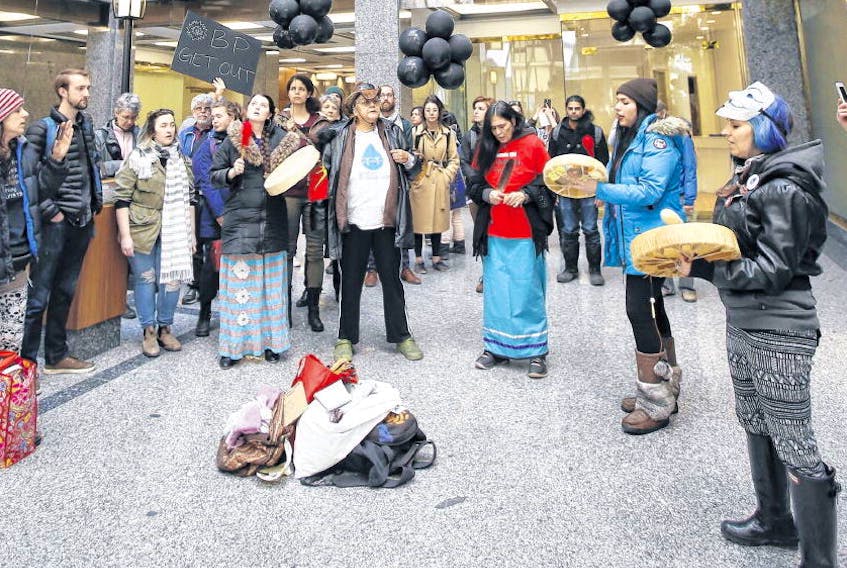Nobody seemed to be in a welcoming mood Thursday afternoon at Founders Square in downtown Halifax.
Dozens of protesters gathered at the building to tell BP Canada Energy Group their offshore drilling rig is an interloper off the province’s coast.
When the group tried to enter the building to deliver a signed card to the BP office upstairs, they were met by Halifax police and security and told they were unwelcome inside.
“The purpose of the party was to make sure that BP understood just how unwelcome they are,” said Angela Giles, the Atlantic organizer for the Council of Canadians and a driving force behind the protest that attracted environmentalists, Mi’kmaq activists and advocates for the local fishing industry.
The protest was spawned by a decision released Saturday by the Canada-Nova Scotia Offshore Petroleum Board authorizing BP Canada to move its rig, the Seadrill West Aquarius, into Canadian-Nova Scotia waters for preparatory work in advance of its plan to drill an exploration well.
The rig was making its way Wednesday afternoon to the lease site, some 50 kilometres off Sable Island.
The initial authorization limits the scope of work to preparatory activities on board the rig, the petroleum board said in a release. It does not permit BP Canada to start drilling the exploration well.
“Vessels and equipment, along with necessary plans and procedures, were appropriately reviewed to ensure that all preparatory activity will be conducted in a safe and environmentally responsible manner,” Stuart Pinks, the petroleum board’s CEO, said in the release. He said the board is confident BP met all regulatory requirements.
Any confidence in BP did not filter down to the protesters.
“The card said we wanted to protect the offshorehere, that we have industries
here that have been the backbone of our economy for decades and we don’t feel that putting those at risk, along with the climate, warrants this industry coming into our offshore,” Giles said of the card that protesters tried to deliver to the BP Canada office.
“There were no arrests,” said Halifax police spokeswoman Const. Carol McIsaac. She said the protesters entered the building, were asked to leave and did so.
Giles said BP, like most oil and gas companies, have a dubious track record of spills.
“As much as they would like to argue that the technology is safe and the most up to date and the regulations are there to protect us, the reality is that oil and gas cannot promise that they will never have a spill. To us, that is simply not worth the risk. We love our ocean. This is Canada’s ocean playground, as we have on our licence plate, and we want to keep it that way. We don’t want to become BP’s next Gulf of Mexico Deepwater Horizon scenario.”
That scenario was the April 2010 blowout of the Deepwater Horizon, a submersible rig that was leased to BP Canada’s parent company, BP. The blowout resulted in an explosion that killed 11 crewmen and ignited a fireball visible 64 kilometres away. The Horizon sank, leaving the well gushing and causing the largest oil spill ever in U.S. waters. The U.S. government estimated the total discharge at 4.9 million barrels, before the well was sealed.
The spill caused extensive damage to marine and wildlife habitats and fishing and tourism industries. Criminal and civil settlements and payments to a trust fund had cost the company US$42.2 billion. A judge later ruled that BP was primarily responsible for the spill because of gross negligence and reckless conduct. The company agreed to pay US$18.7 billion in fines.
“We want to protect our ocean for ourselves, not just for industry, but there are so many people who use it for recreational purposes as well,” Giles said. “Obviously, the marine ecosystem is dependent on a healthy environment . . . the threats are very real and BP, having that history of that huge, catastrophic disaster in the Gulf of Mexico, that helps for people to truly understand what is at risk.”
The petroleum board has said that BP Canada must receive further authorization and an approval to drill before drilling operations are permitted. That approval can be issued after a comprehensive review process is complete.
The board began reviewing information submitted by BP Canada in support of their planned offshore drilling program in April 2017. An application for authorization to drill one deep water exploration well about 330 kilometres from Halifax, and in about 2,800 metres of water depth, was officially submitted on Sept. 21, 2017.
Carrying black balloons, signs and dead flowers, the protest group remains determined to make its point with the company and the board.
“We have some concerns with the way the (board) operates and who its board members are,” Giles said. “The biggest concern is the conflicting mandate that exists where the board is supposed to be protecting the marine environment while also regulating and promoting offshore oil and gas. Historically, they are going to allow offshore oil and gas drilling to go ahead. The board members predominately have a history in the industry, they’ve worked in the industry, and that is where their experience is coming from. Fundamentally, they believe that oil and gas can be (extracted) safely. History points to the inaccuracies of that.”
Giles said the Council of Canadians has an online petition and is working to mobilize people working in the fisheries and tourism, and teaming up with the Mi’kmaq people who share concerns about the oil industry.
“We know that us hosting an unwelcoming party doesn’t mean that BP is going to shut down and push off and abandon the prospect here. There is a lot of work left to be done.”









